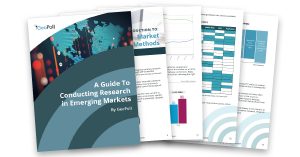GeoPoll is pleased to release our latest report, which provides expert guidance on the nuances of conducting market research in emerging markets. The free, 30-page document thoroughly explains the different methods of market research and GeoPoll shares valuable insight on how to connect with people in hard to reach areas of the world.
Market Research
Almost every company conducts some sort of market research as part of market and environmental analysis. Anything from Google Analytics to in-depth studies can be forms of market research. Participating in this process of gathering and evaluating information is typically an essential step for business strategy development.
Generally speaking, market research is important for brands because it allows leadership within a business to have insight on a market’s current state, which determines how business decisions are approached. A strong understanding of a market and its potential customers drives strategic business plans and, if done thoroughly, can make the difference between success or failure of a particular approach.
Market Research in Africa and Emerging Markets
Conducting market research in Africa and other emerging markets provides a unique set of challenges to expanding brands, media agencies, and other companies. Traditionally, there has not been as much market research conducted in emerging markets like those in Africa, Asia, and Latin America. This is mainly due to challenges around data collection and lack of investment by brands in these areas.
Africa, in particular, is a challenging area to conduct market research due to the size of the continent, but also because of the cultural diversity between countries and even within smaller regions in a country. It is estimated that more than 2,000 languages are spoken in Africa and many regions have their own distinct cultures. Additional challenges arise when conducting research in areas experiencing conflict, famine, or other challenges.
Some countries in the African continent are growing steadily economically and have become the next frontier for multinationals seeking to grow their customer base in untapped markets. For this reason, there has been an increased presence of foreign owned brands in African markets in recent years. In 2017, it was found that non-African brands were dominant in the area at an 84% market share. An annual survey and valuation of the Top 100 brands in Africa by Brand Africa, Kantar TNS & GeoPoll in 2017 found that 42 of the Top 100 most admired brands are from Europe, and a further 25 are from the USA. Statistics like this one prove that African consumers are responding to the changes and adopting foreign brands.
African consumers may be ready for brands to expand into their marketplaces, but Africa lacks the data that many large corporations are accustomed to accessing easily. Businesses have found the lack of previously conducted research an obstacle to expanding into the African markets. In this guide, we will discuss the root of why information on African consumers has historically been limited, and what methods GeoPoll has found to be successful for companies looking to conduct research in emerging markets.
Overview Of This Guide
This guide provides information on special considerations and best practices for performing market research in emerging markets. GeoPoll’s expertise was used to outline ways for brands to work-around challenges in order to gain necessary insight into the consumers they are interested in learning more about.
Outline of Guide’s Content
- Introduction
- What is Market Research
- Market Research in Africa and Emerging Markets
- Introduction to Market Research Methods
- Primary Vs. Secondary Research
- Secondary Market Research Methods
- The Process of Secondary Research
- Challenges of Secondary Research in Emerging Markets
- Primary Market Research Methods
- Challenges of Collecting Primary Research in Emerging Markets
- Conducting Market Research in Africa
- Conducting Survey Research In Emerging Markets
- Modes of survey data collection
- Face to Face
- Pen and Paper
- CAPI (Computer Assisted Personal Interviewing)
- CAWI (Computer Assisted Web Interviewing)
- GeoPoll’s Modes of Survey Data Collection
- Mobile/Feature Phone-Based Research
- SMS (Text Message)
- USSD (Unstructured Supplementary Service Data)
- Voice
- CATI (Computer Assisted Telephone Interviewing)
- IVR (Interactive Voice Response)
- Online/Smartphone-Based Research
- Non-Mobile Computer
- Mobile-Web
- Mobile Application
- Face to Face
- Considerations For Conducting Survey Research In Emerging Markets
- Choosing The Right Survey Mode For Your Project
- GeoPoll’s Survey Research Process
- Modes of survey data collection
- Conclusion
- About GeoPoll
- GeoPoll’s Survey Research Process
Download the report today!




